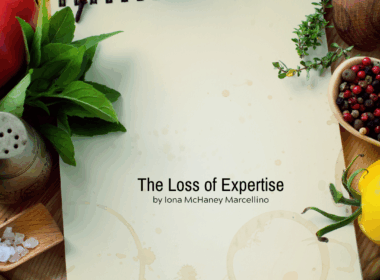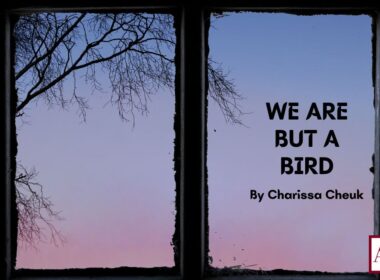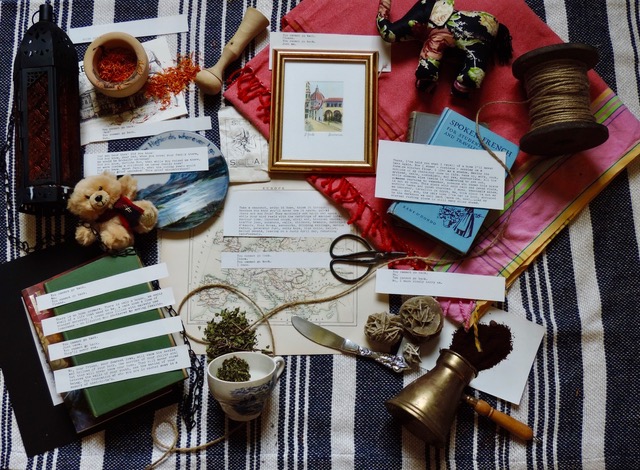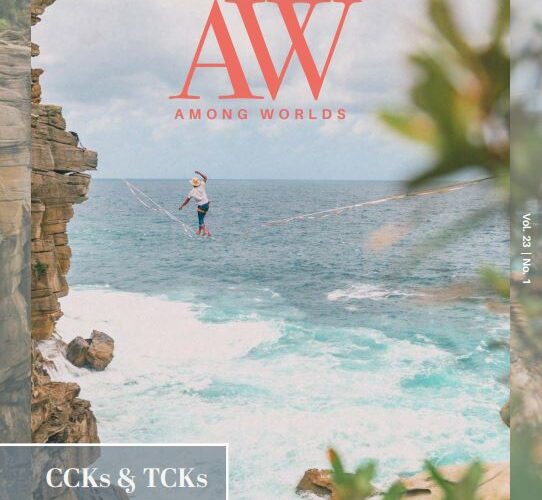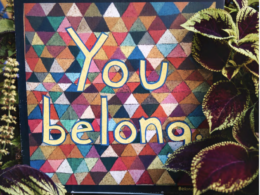By Ruth Van Reken
When I saw that Among Worlds had chosen to focus on “CCKs and TCKs” rather than “TCKs and Other CCKs,” I thought of Ecclesiastes 1:9—“there is nothing new under the sun.” The word and in the title makes it seem as if these are two distinctly separate groups. The word other indicates what they did write in the explanation of this topic—that TCKs are part of a greater whole of others who also grow up cross-culturally. But let me explain why I felt so weary with a “been there, done that” feeling when I initially saw the “CCKs and TCKs” theme.
Forty years ago, I knew I was a missionary kid (MK) but had never heard the term third culture kid (TCK). In 1984, a few months before the first International Conference on Missionary Kids (ICMK) held in Manila, my mother sent me a two-page article by David Pollock simply titled “Third Culture Kids.” That was my first awareness of that term, and while there were points of connection with it, some statements didn’t particularly resonate for me. I mostly put the idea aside.
When I attended that first ICMK, I don’t remember the TCK term being used much. All attendees came from the mission community and MK was a familiar, understood, and accepted term used in most sessions and private conversations as well. No problem.
By 1987 when the second ICMK convened in Quito, the TCK term had more visibility. Dave Pollock had begun to travel around the world to talk about the TCK profile of common characteristics he had noticed after many years of working primarily with young people who had grown up in other cultures due to a parents’ career choice. This was the same basic cohort of children Ruth Useem had studied during her time in India. For all the differences in details between different “sectors” of those living overseas for reasons of their careers—military, missionary, foreign service, and corporate—common themes began to emerge for how their children responded to such a lifestyle of cross-cultural mobility.
At that second ICMK the discussions on what our terms do and don’t mean began, and they are apparently still going on!
Some questioned the very concept of “the Third Culture.” How could there be some type of culture that had no geographic or ethnic boundaries? The discussions raged on about not only what the third culture might mean, but if it was even a legitimate name at all!
Many adult MKs who were there definitely did not want to lose the name they had always been called. One said to me, “I don’t want to be a TCK. MKs’ issues are too different and they [other TCKs] would never get us.”
Later, I realized many military offspring felt the same way about their original name. “We’re Army BRATS. We don’t want to be TCKs.” This is what Janet Bennet called a sense of “terminal uniqueness.” They believed their story was so special no one else who had a story with different details could possibly understand them.
As time (and discussions!) went on, it became obvious there were other ways people were accompanying parents into other cultures for reasons other than the parents’ career. Dave Pollock became interested in the parallels of the TCK and refugee experience in his last years. He also noticed that some who had made many cultural moves within national borders also related to the traditional TCK profile even though they hadn’t lived internationally. The question then became “Do we let all of these people in the ‘TCK club’ or not? What is the essence of what it means to be a TCK anyway?”
This is when what I might call the “turf wars” began. As different sectors finally began to agree that they were not only MKs or Army BRATS or whatever, but also TCKs in the sense of growing up as some form of “expat kids” like those first named as TCKs, they didn’t want to let others in. For TCKs, as for people of any specific background, it is often easier to identify by difference rather than likeness.
At the same time, still others said, “Let everyone in! Anyone who has interacted with many cultural worlds as a child for whatever reason can be a TCK.” While it was an appealing idea, the result would have been what Norma McCaig, founder of Global Nomads, cautioned years ago. “If you don’t define why TCKs accompanied parents into another culture, you cannot do research or properly understand any story as the variables will be far too many.”
She was right. Yvonne Kallane, a researcher on matters related to global family living, wrote me the following after a recent conversation we had on this matter.
“The major reason for construct clarity (n.b., having clear definitions) is that unless you have it, then you cannot compare studies… and advance the field. There needs to be some underlying baseline for who is and who is not part of the concept… and that needs to be rationalised over some period of time and then put out into the field for discussion and improvement… and then published…. I am starting to see a very clear picture now as to why TCK research does not have the rigorous base I had hoped to find it would. I am frustrated that after five decades since the Useems’ work that there is still no established construct that we all agree on about this in the academic research.“
At the same time all of these endless discussions were going on about who was or wasn’t a “true TCK,” more and more people came to me after seminars explaining the TCK concepts and profile and made comments like, “I related to almost everything you said but I never went overseas. Why am I relating?”
When I would then ask them to tell me their story, there was always an overt or a silent cross-cultural experience in that story. Maybe their parents were from two countries. Maybe they were international adoptees. Maybe they were from a minority community but went to school in the majority cultural context. I certainly wanted them to feel included in our topic and talks since it seemed they resonated deeply with the benefits and challenges of the TCK profile. But then we were back to the stuck points mentioned above. So, did they or didn’t they fit? And on what basis could we include or exclude them as TCKs?
Who knew? But in my mind this stalemate needed to be broken because we were beginning to miss the forest for the trees.
The emerging reality was that something much bigger than what we had considered was happening in our world. In 1984 at the first ICMK, sociologist Ted Ward had remarked that MKs (then extrapolated to TCKs later) were the prototype citizen of the future. It seemed that time had now come. But how could we look at what was going on and use what we had learned to examine these global shifts if we were still stuck in fussing about the TCK language?
To be honest, I felt rather boxed in. How could we move to future explorations if we were stuck in the past conversations?
To be honest, I felt rather boxed in.
After a particular incident in a local school where the administration there proudly showed me what they considered a “multicultural program” but that had no understanding for what I meant by TCKs, I decided something had to change…at least for me. I needed to find a both/and way to look at things, not this either/or choice I kept encountering.
The next day I returned to the school and said “How about if we change the language from TCK or ‘multicultural’ and use new language so all of us have to consider what we are talking about rather than assuming we already know? Let’s try ‘cross-cultural.’”
And it worked! I simply said CCKs were those who had grown up meaningfully interacting with two or more cultural communities for whatever reason. It did not depend on a parent’s job or where geography did or didn’t take them. Simply that they had grown up amid many cultural worlds. This is the basic model that began that day.
The Cross-Cultural Kid (CCK) Model ©2002 Ruth E. VanReken, updated 2017
In order to better assess what were the universals creating this strong emotional sense of connection between CCKs of all groups and what might be the distinctives in their responses that was sector or subset specific, I called the TCK cohort initially studied by Useem and Pollock “traditional TCKs.” I named those who had made the cross-cultural moves within their own country “domestic TCKs.” It had nothing to do with ranking if one was better or more prestigious than the other. I simply wanted to know if it made a difference in outcome if you did or did not change presidents, types of currency, etc., in the moving. I wrote my first article explaining this new model in the Intercultural Management Journal in 2005 with my friend, Paulette Bethel.
Immediately after the seminar in which I first displayed the CCK model, the magic happened. Without long discourse, people saw where they fit. Some came up to tell me they had just recognized the cross-cultural aspect of their story and how it explained so much—similar to the many times traditional TCKs had told me of their “Aha!” moments in the past. I was a happy camper!
The bigger surprise, however, came when someone asked if you could be in more than one circle at the same time. While I had thought of these as separate experiences, this person said she was in five circles right off the bat!
Wow! The window to looking in fresh ways at what was going on in our globalizing world had begun to open! I had never thought of how this model might reveal the increasing cultural complexity so many in our world now experience. Unlike my “simple” TCK story of yesteryear, I soon realized many traditional TCKs were also in multiple other circles as well. It became clear as I listened to all these disparate stories that the themes of identity confusion and loss of a sense of belonging we talk about in traditional TCK circles were common for virtually all CCKs. The question then is why? Is there something about growing up cross-culturally for any reason that creates these voids? If so, what is it and what can we do to help ameliorate that internal sense of isolation many have? In the traditional TCK studies, we link our losses and resulting unresolved grief to frequency of mobility and losing our worlds. Most CCK circles seem to identify with hidden loss and grief, but they may not relate to physical mobility. Are there other themes here we can explore? How can we also identify and build on common gifts such as using cross-cultural skill sets, being potential cultural bridges, thinking outside the box, and so on?
Most CCK circles seem to identify with hidden loss and grief.
To look in more depth at those questions, it also became clear we needed to consider how different details of each group could also shape their stories. I realized I had been a minority growing up in Nigeria, but mine remained a position of privilege, where that is not true for all minorities. Growing up in a faith-based system rather than a military system meant how I did or didn’t practice that faith as an adult would influence how others in my community saw me in a different way from how the military or corporate child might be perceived.
Whether children of immigrants physically resemble their new country or not may or may not intensify their sense of belonging or sense of alienation. For me, taking the many things I have learned in studying the traditional TCK “petri dish” and the common characteristics that come from growing up with a cross-cultural lifestyle and one with high mobility with the result of the most common challenges being questions of identity and unrecognized and unresolved grief. Each circle in this updated model can add more so researchers can try to better understand what factors do or don’t matter in creating both the commonalities and the things unique to that subset.
The Cross-Cultural Kid (CCK) Model Expanded ©2002 Ruth E. VanReken, updated 2017
For example, under Children of Immigrants, were they born in the new country? Do they look similar to or different from the dominant culture in which they live? Depending on that, how/is their sense of identity affected? And so it goes.
To me this was the next logical step up the ladder in the TCK chain. It made life so simple for me and so expansive to keep growing in all I saw happening around me in so many new ways and places. It helps us join our understandings from the TCK world to what others are learning in their groups. If we are all in the same basic circle, we can gather for these wonderings. I felt I could finally run towards this goal instead of limping to get there.
But in the last couple of years, it seems the same patterns of long ago are being repeated. I see the same resistance that MKs or military kids (or other sectors of TCKs) expressed to me about not wanting to be TCKs playing out in that TCKs are now resisting being part of the CCK circle. I have been told I am an elitist as I simply don’t want to share the TCK label with others of less privilege. Others tell me it is simple: just let all your CCKs be TCKs and then the issue is over.
For sure I am not trying to keep anyone “out,” but if you say all can be named as TCKs, then please tell me how you define “third culture” in this overarching context. Maybe there are better words than either TCK or CCK to name what is going on globally. In the name of “construct clarity” we need to figure out what we are talking about before we can say who we are talking about.
So yes, I felt tired when I saw the topic raised once more. I keep hoping we can move ahead and past these circular (to me) discussions of the past forty years. There is so much that is amazingly interesting to think about and learn about as our world changes. Why are we so seemingly afraid to take what we have learned from our stories and journeys and join with others to explore it all? Bottom line, I simply don’t understand why it seems so hard for TCKs to agree they are also CCKs anymore than I understood why my MK friend of years past didn’t want to be a TCK. What is the loss of being both/and rather than either/or?
But I will wait to see what others say here. Perhaps this will be a most insightful process of comparing and contrasting the stories in ways that fulfill my dream of understanding more. I hope so. Just because something feels like how it has been doesn’t mean it is. I knew at the beginning of creating the CCK model that I might not live long enough to fulfill the dream of organizing a cross-disciplinary, cross-experience gathering where researchers into each of these subsets would gather and share their wisdom and see what common themes or distinctives arise from an academic approach as well. And who will consider what happens developmentally to a child who is in many of these CCKs circles all at the same time? Maybe some of you will be those folks who take the topic on. It really is an interesting, thought-provoking world, and we are part of the discovery process as we discuss how this impacts us all and how we can be positive change makers in the process. Have fun!
1 Schaetti, Barbara. Phoenix Rising. A Question of Cultural Identity. https://transitiondynamics.wordpress.com/resources-and-products/articles-and-publications/phoenix-rising/
2 Yvonne Kallane, personal email, January 11, 2023
3 https://eurotck.net/wp-content/uploads/2019/06/etck_2013_cross_cultural_kids.pdf
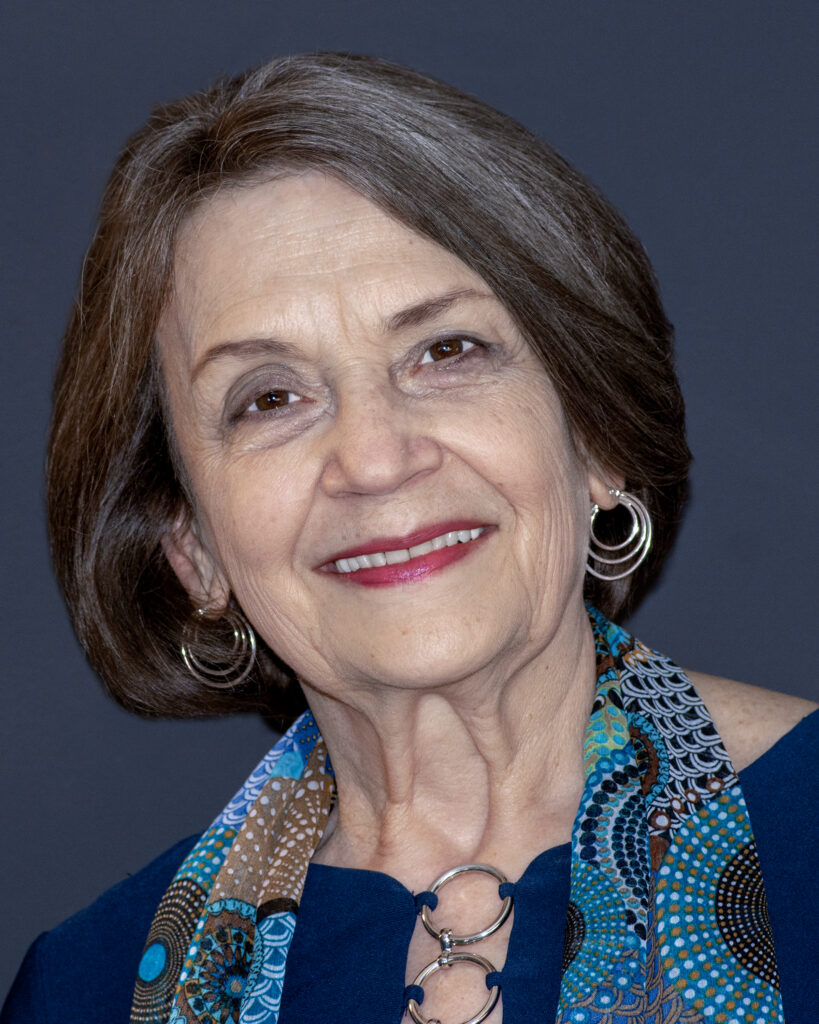
Ruth Van Reken is a second-generation third culture kid* (TCK) and mother of three now-adult TCKs. She is co-author of Third Culture Kids: Growing Up Among Worlds, 3rd ed., and author of Letters Never Sent, her personal journaling seeking to understand the long-term impact of her cross-cultural childhood. For more than thirty-five years (pre-COVID19!) Ruth traveled extensively speaking about issues related to the impact of global mobility on individuals, families, and societies. Since 2001 she has expanded her interest to work with those she calls cross-cultural kids (CCKs)—children who grow up cross-culturally for any reason. She is co-founder and past chairperson of Families in Global Transition. In addition to her two books and many articles, she has written a chapter in other books including Strangers at Home, Unrooted Childhoods, and Writing Out of Limbo. In 2019 she received an Honorary Doctor of Letters degree from Wheaton College for her life’s work. She now lives in Indianapolis, Indiana (US) with her husband, David.
*A child who spends a significant period of time during his or her developmental years growing up in a culture outside the parents’ culture.




